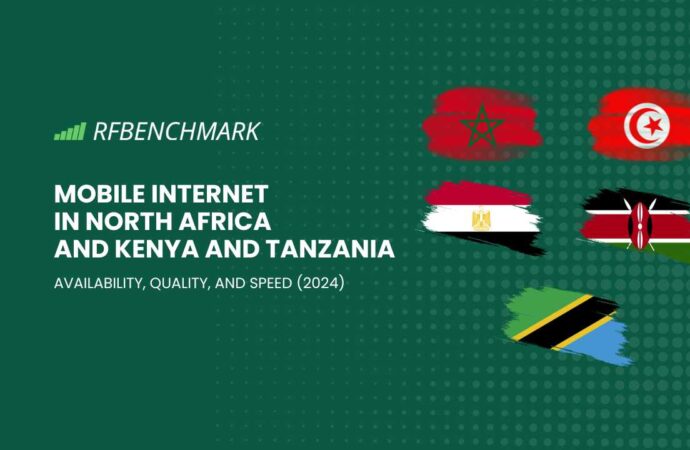Until recently, Africa was mainly seen as a destination for seasoned backpackers and experienced travellers. This changed after the COVID-19 pandemic, which made Zanzibar, a part of Tanzania, a popular holiday spot. Now, tourists from Europe are also taking interest in other countries, like Kenya, famous for its stunning national parks, and Morocco, which is set to host the men’s World Cup.
With the increase in tourism, there’s also a growing concern about mobile Internet quality. In today’s piece, we explore how well popular tourist destinations in North Africa—Morocco, Tunisia, and Egypt—as well as Kenya and Tanzania, are equipped to provide tourists with fast and reliable mobile Internet.
Mobile Internet in North Africa, Kenya, and Tanzania – availability, quality, and speed
Mobile Internet in North Africa, including Egypt, Morocco, and Tunisia, is growing rapidly due to investment in telecommunications infrastructure. More people are using smartphones for daily activities and work, leading to a steady increase in mobile Internet access. The quality of Internet service varies: fast LTE connections are common in large cities and urban areas, but mobile Internet can be slower and less reliable in rural areas. Generally, connection speeds in North Africa are good enough for browsing the web, using social media, and streaming videos, although there are still issues with network coverage and latency.
In Kenya and Tanzania, the mobile Internet scene is also evolving quickly, fuelled by the increasing popularity of smartphones and decreasing telecom service costs. In Kenya, significant investments in 4G and 5G technologies have greatly enhanced mobile Internet quality and availability. In Tanzania, the expansion of 4G networks is improving Internet access even in remote areas. Connection quality and speed in these countries can vary, but generally support basic online activities like messaging on WhatsApp, watching YouTube videos, or working remotely. Despite these advances, more investment in infrastructure is needed to ensure consistent coverage and reliable connections throughout the region.
Mobile Internet in North Africa, Kenya, and Tanzania – buying SIM cards
In North Africa, Kenya, and Tanzania, buying SIM cards is quite straightforward. In countries such as Egypt, Morocco, Algeria, Kenya, and Tanzania, they are available at telecom operators’ shops, airports, shopping centres, kiosks, and licensed vendors. Many airports even have special SIM card outlets for tourists, making it easy to get connected as soon as you arrive in the country.
When purchasing a SIM card in these regions, you typically need to show a valid identity document, like a passport, to register the SIM card in your name. This step helps prevent fraud and ensures security.
The cost of a SIM card varies by country and operator. In North Africa, prices range from a few to several dollars, depending on the starter package and the amount of data included. For instance, in Morocco, a basic package might cost between $5 and $10. In Kenya, prices start at around $1 to $2 for a basic SIM card without data, and data packages are quite affordable, starting at just a few dollars. In Tanzania, SIM card prices are similar, and data packages are offered at different price points to accommodate various needs.
What is the speed of mobile Internet in Morocco?
Morocco’s mobile market is among the most developed in the region, with a penetration rate of 137.5%. The 3 main mobile network operators—Maroc Telecom, Orange, and Inwi—provide a mix of mobile, fixed, and wireless services. With their strong LTE infrastructure, they are improving their mobile data services. The increase in mobile data traffic is largely due to the widespread use of smartphones, which make up about 80% of all mobile phones currently in use. These operators also lead in providing Internet connections across Morocco.
The Moroccan telecoms market was valued at $3.5 billion in 2021 and is expected to grow by over 3% annually from 2021 to 2026. The market shares for 2G to 4G services are distributed among the 3 operators: Maroc Telecom with a 42.9% share, Orange Maroc with 33.2%, and Inwi with 23.9%. Combined, they account for more than 75% of the total industry revenues.
Maroc Telecom, the largest operator, is also active in several African countries including Benin, Burkina Faso, and Côte d’Ivoire. Ahead of the 5G deployment planned for 2024, these operators are investing heavily in mobile network coverage and infrastructure, creating significant opportunities for US technology companies in the emerging 5G market.
Morocco also stands out for having the fastest mobile Internet in the region, with average download speeds of 45.1 Mbps and upload speeds of 12.75 Mbps. The data latency, or ping, is just 27 ms, providing a smooth and reliable Internet experience.
What is the speed of mobile Internet in Tunisia?
Tunisia has one of the highest rates of mobile subscribers in Africa, with more than 15.9 million mobile lines. In 2022, there were around 12.3 million Internet subscribers, with 81.3% (or 10 million) accessing the Internet via smartphones. While the growth of mobile services in Tunisia has slowed compared to previous years, the market remains open and appealing to foreign companies, which do not face a bias towards the state-owned telecommunications company, Tunisie Telecom.
The Tunisian mobile services market is dominated by 4 major operators. The largest telecommunications company in the country is Ooredoo (Orascom Telecom Tunisia). In 2022, Tunisie Telecom held a 39.7% market share, Ooredoo had 37.4%, and Orange Tunisie accounted for 22.9%. Lycamobile had a very small market share. Despite the presence of a state-owned operator, there is balanced competition among companies, fostering further development and modernisation of the telecommunications sector in Tunisia.
Mobile Internet in Tunisia, while not as fast as European speeds, performs comparably to other countries in the region. With an average download speed of 28.6 Mbps and an upload speed of 14.3 Mbps, Tunisian mobile internet is sufficiently fast for most users. A latency of 20 ms ensures a smooth and reliable network experience.
What is the speed of mobile Internet in Egypt?
In Egypt, there are more than 10 mobile operators, yet a few major players dominate the market. The main mobile networks fall into 4 key groups that hold most of the market share. These include Orange, Vodafone, Etisalat, and EC (formerly Telecom Egypt). Orange, a part of the global Orange Group, has about 33 million subscribers. Vodafone, also part of a global network, serves roughly 44 million users. Etisalat, under the international Etisalat Group, supports about 26 million subscribers. EC, the state-owned entity previously known as Telecom Egypt, serves around 17 million users.
These 4 primary networks control the vast majority of Egypt’s mobile market. They offer comprehensive services across the country, enabled by spectrum licences that allow them to provide 2G, 3G, and 4G services. Their extensive reach and advanced network infrastructure enable them to offer a range of mobile services, from basic voice calls to high-speed mobile Internet. The dominance of these operators not only stabilises but also drives the growth of the telecommunications sector in Egypt, attracting foreign investment and encouraging technological innovation.
Mobile Internet speed and quality in Egypt are generally good, but there are some areas for improvement, especially regarding upload speeds. The average download speed is 26.2 Mbps, which supports efficient web browsing, video streaming, and social media use. The latency, at 33 ms, is low enough to ensure smooth operation of online services like video chatting and gaming. However, when compared with other countries in the ranking, Egypt’s latency is the poorest, which could impact the overall user experience.
Egypt’s upload speeds, which average at 6.63 Mbps, are less impressive. This is particularly noticeable for users who need to upload large files frequently, use cloud services for data storage, or host live broadcasts. Despite these issues, the overall quality of Internet service in Egypt is adequate for most day-to-day users, though further investment in network infrastructure is necessary to boost upload speeds and keep up with growing technological demands.
What is the speed of mobile Internet in Kenya?
The mobile operator market in Kenya is dominated by 3 major players. Safaricom is the largest operator, known for its extensive network coverage and innovative services like M-Pesa. Airtel Kenya, part of the global Airtel group, competes with aggressive data packages and services to boost its market share. Telkom Kenya has revamped its strategy and is investing in infrastructure to offer attractive packages to its customers. This fierce competition results in beneficial deals for consumers and drives ongoing advancements in telecommunications technology.
Mobile Internet speeds in Kenya are moderate, ranking just above Egypt in this survey. The average download speed in Kenya is 27.4 Mbps, and the upload speed is 10.1 Mbps. With a ping of 30 ms, the performance is sufficient for smooth video calls and online gaming. Although Internet speeds in Kenya are not the fastest compared to other regional countries, they still meet the needs of most users.
What is the speed of mobile Internet in Tanzania?
Telecommunications services in Tanzania include radio, television, fixed and mobile telephony, and the Internet, which are available on both the mainland and in the semi-autonomous archipelago of Zanzibar. The country has a well-developed telecommunications infrastructure, ensuring widespread access to various communication methods. Internet and mobile services are especially popular, with operators continually striving to meet the growing demand for modern technology and high-speed connections.
As of June 2023, Vodacom remains the leading mobile service provider in Tanzania, holding a 30% market share. Airtel and Tigo are the next largest providers, securing second and third place respectively, with the market primarily shared among these 3 major companies. Vodacom serves over 19.1 million subscribers, while Airtel and Tigo each have around 17.5 million subscribers. The dominance of these 3 operators in the telecom market ensures stability and competitiveness, leading to improved service quality for users across the country.
Tanzania’s mobile Internet quality and speed are impressive, ranking second among the African countries we’ve discussed, second only to Morocco. With average download speeds of 29.1 Mbps and upload speeds of 13.4 Mbps, Tanzania stands out in the region. While these speeds are lower compared to European or Asian standards, they’re still good enough for most users. A latency of 24 ms ensures that activities requiring fast responses, like online gaming and video conferencing, run smoothly.
For travellers and tourists, the mobile Internet in Tanzania is more than capable of handling everyday activities, enabling seamless web browsing, social media use, video streaming, and video calls.










Leave a Comment
Your email address will not be published. Required fields are marked with *